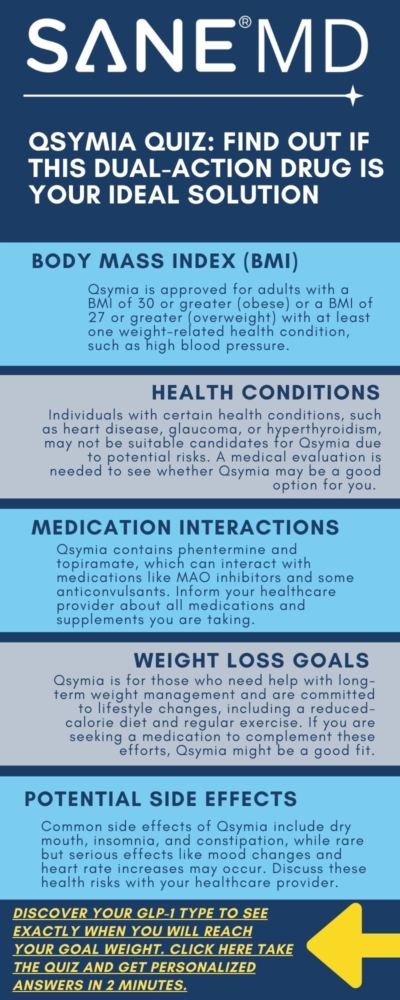Qsymia Quiz: Find Out If this Dual Action Drug Is Your Ideal Solution
Dr. Matthew Olesiak, MD, is the Chief Medical Director at SANESolution, a renowned wellness technology company dedicated to providing evidence-based solutions for optimal living. Dr. Olesiak earned his medical degree from the prestigious Jagiellonian University Medical College in Kraków, Poland, where he developed a strong foundation in medicine.
Managing weight can be a complex and challenging process. Qsymia, a dual-action prescription medication, offers a medically supervised approach for individuals seeking assistance with weight management. By combining phentermine and topiramate, Qsymia targets appetite and satiety, helping individuals stick to a healthier lifestyle. To determine if this medication aligns with your needs, take the Qsymia quiz, designed to guide you toward the most appropriate weight management solution.
Qsymia is a prescription weight loss drug designed to help individuals manage their weight effectively. It is particularly beneficial for those with a high Body Mass Index (BMI), as BMI is a primary factor in determining eligibility for such medications. The effectiveness of Qsymia, like other prescription weight loss medications, can vary based on individual needs and responses, making it essential to consult with a healthcare provider to determine the best option.
Key Takeaways
- Qsymia combines phentermine and topiramate to suppress appetite and enhance satiety.
- It works best when paired with lifestyle changes, such as diet and exercise.
- Take the Qsymia quiz to find out if Qsymia aligns with your weight management goals.
What is Qsymia?
Qsymia is a prescription medication specifically designed for weight management. Unlike medications that solely focus on weight loss, Qsymia’s purpose is to assist individuals in achieving and maintaining a healthy weight when combined with a reduced-calorie diet and regular physical activity. It is an integral part of a complete weight loss journey.
Its dual-action mechanism combines two components: phentermine, an appetite suppressant, and topiramate, which enhances feelings of fullness. Together, they create a synergistic effect, making it easier for individuals to consume fewer calories and feel satisfied for longer.
To explore whether Qsymia fits your weight management goals, consider taking the weight loss drug quiz here. It evaluates your needs and provides insights into whether Qsymia might be a suitable option for you.
How Does Qsymia Work?
The effectiveness of Qsymia lies in its ability to target key areas of the brain responsible for hunger and satiety. Phentermine suppresses appetite by affecting the central nervous system, while topiramate enhances feelings of fullness and may reduce cravings for unhealthy foods.
Also, Qsymia has been shown to improve blood sugar regulation and increase insulin sensitivity, supporting better metabolic health. By addressing these factors, the medication can help individuals adhere to a healthier diet and lifestyle over time.
Understanding how Qsymia works is essential to making an informed decision.
Benefits of Qsymia
Qsymia offers several benefits for those struggling with weight management:
- Effective Weight Loss: Clinical studies report that individuals taking Qsymia can lose 6.7%-8.9% of their total body weight within a year.
- Improved Cardiovascular Health: The medication may help lower blood pressure and improve cholesterol levels, contributing to better heart health.
- Better Glycemic Control: For individuals with type 2 diabetes or prediabetes, Qsymia can enhance blood sugar regulation and reduce the risk of developing further complications.
- Reduced Sleep Apnea Risk: Weight loss achieved through Qsymia may also decrease the severity or prevalence of sleep apnea.
These benefits highlight Qsymia’s potential to improve both weight management and overall health.
Qsemia Quiz: Who Should Take Qsymia for Weight-Related Health Conditions?
Qsymia is approved for adults with a body mass index (BMI) of:
- 30 or higher (obesity).
- 27 or higher (overweight) with a weight-related condition, such as type 2 diabetes, hypertension, or high cholesterol.
However, Qsymia is not suitable for everyone. Pregnant women, individuals with hypersensitivity to its components, or those with certain medical conditions may need to explore alternative weight management solutions.
Dosage Guidelines for Qsymia
Qsymia is available in four strengths, allowing healthcare providers to tailor the treatment to individual needs.
- The starting dose is 3.75 mg phentermine/23 mg topiramate extended-release, which is gradually increased.
- The recommended daily dose is 7.5 mg phentermine/46 mg topiramate extended-release.
- For those requiring additional weight loss, the maximum dose is 15 mg phentermine/92 mg topiramate extended-release.
Proper dosage adjustments and regular medical supervision are crucial for safety and effectiveness.
Potential Side Effects of Qsymia
Like any medication, Qsymia may cause side effects. It is important to be aware of these before starting treatment.
Common side effects include:
- Dizziness.
- Headache.
- Constipation.
Rare but serious risks may include:
- Suicidal thoughts or mood changes.
- Depression or anxiety.
Qsymia is contraindicated during pregnancy due to the potential risk of birth defects.
Lifestyle Considerations with Qsymia
For optimal results, Qsymia should be combined with meaningful lifestyle changes. These include:
- Balanced Diet: Focus on nutrient-dense foods while limiting calorie-dense, low-nutrient options.
- Regular Exercise: Incorporate moderate physical activity, such as walking or resistance training, into your routine.
- Behavioral Strategies: Use tools like food diaries or activity trackers to monitor progress and build sustainable habits.
Taking the weight loss drug quiz can help identify whether Qsymia, alongside these lifestyle adjustments, is the right path for you.
Maintaining Weight Loss with Qsymia
Weight maintenance requires a long-term commitment to healthy behaviors. Qsymia can be part of a sustainable weight management plan when paired with ongoing lifestyle changes and medical supervision.
Patients are advised not to discontinue Qsymia abruptly, as withdrawal symptoms may occur. Regular consultations with a healthcare provider are crucial for tracking progress and making any necessary changes to the treatment plan.
Comparison to Other Weight Loss Medications
Qsymia’s combination of phentermine and topiramate sets it apart from other weight loss medications that target a single aspect of weight management. Qsymia addresses both hunger and satiety, offering a dual-action approach.
Success Stories with Qsymia
In clinical trials, Qsymia has been shown to result in an average weight loss of 10-11% of body weight. This significant weight loss can lead to improved health outcomes, including a reduced risk of high blood pressure, type 2 diabetes, and other weight-related health conditions.
The combination of phentermine and topiramate in Qsymia creates a synergistic effect, enhancing weight loss and supporting long-term weight maintenance.
If you’re considering Qsymia, take the weight loss drug quiz to see if this dual-action medication could be the right fit for your weight management journey.
Frequently Asked Questions About Qsymia
This section provides detailed answers to common questions about Qsymia, helping readers understand its uses, benefits, and considerations.
1. What is Qsymia, and how does it work?
Qsymia is a prescription medication that combines phentermine and topiramate to support weight management. Phentermine suppresses appetite by affecting the central nervous system, reducing the urge to eat. Topiramate enhances feelings of fullness and helps control cravings for unhealthy foods. Together, these components target hunger and satiety, making it easier to follow a healthy diet and maintain calorie control.
By working on these mechanisms, Qsymia supports sustainable weight loss when combined with lifestyle changes.
2. Who is eligible to take Qsymia?
Qsymia is intended for adults with a BMI of 30 or higher, classified as obese, or 27 and above with a weight-related condition like hypertension, type 2 diabetes, or high cholesterol. However, it is not suitable for pregnant women or individuals with certain medical conditions, including glaucoma or hyperthyroidism. Those who are allergic to phentermine or topiramate should also avoid using Qsymia.
Eligibility depends on medical history, so it’s crucial to consult a healthcare provider.
3. What are the common side effects of Qsymia?
Common side effects of Qsymia include dizziness, headache, constipation, dry mouth, and insomnia. These side effects are typically mild and may lessen as your body becomes accustomed to the medication. Rare but serious side effects include mood changes, suicidal thoughts, or worsening depression, which require immediate medical attention. Pregnant individuals should avoid Qsymia entirely due to the risk of birth defects.
Understanding potential side effects and discussing them with a healthcare provider can help manage expectations and ensure safe use.
4. How long should Qsymia be taken?
Qsymia is designed for long-term weight management rather than short-term weight loss. Many patients take the medication for several months to years, depending on their weight loss goals and health progress. Regular medical supervision is essential to monitor side effects, adjust dosages, and assess progress.
Stopping Qsymia abruptly can lead to withdrawal symptoms, so discontinuation should always be done under a doctor’s guidance. Your healthcare provider will determine the appropriate duration based on your individual needs.
5. Can Qsymia be used with other weight loss medications?
Combining Qsymia with other weight loss medications is generally not recommended due to the increased risk of side effects or drug interactions. Each weight loss medication has a unique mechanism, and overlapping treatments could lead to complications.
If you are considering multiple treatments, consult your healthcare provider to weigh the risks and benefits. Safety should always be prioritized when exploring weight management options.
Conclusion
Qsymia offers a dual-action approach to weight management, addressing hunger and satiety while supporting lifestyle changes. By combining medical treatment with healthy habits, individuals can work toward sustainable weight loss and improved health. Take the weight loss drug quiz today to determine if Qsymia might be the right solution for your weight management goals.





